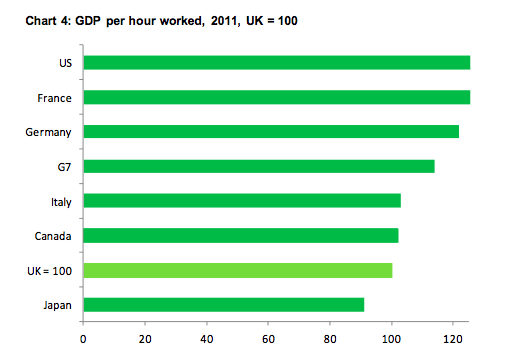Sloth Britannia: Do Germans work harder than Brits?
"This country's workers are plagued by "sloth" and under-perform compared with their foreign rivals, says the London Mayor."
"Why are we still, person for person, so much less productive than the Germans? That is now a question more than a century old, and the answer has nothing to do with the EU. "
Last week Eurosceptic MPs tabled an amendment to the motion welcoming the Queen's Speech, in which they express regret about the lack of legislation paving the way for a referendum on the UK's membership of the European Union.
In this backdrop, and ahead of of the vote, London Mayor Boris Johnson has written an editorial for the Telegraph, in which he sides with the Prime Minister on postponing the referendum until 2017, and advocates for "a new and more mature relationship with our friends and partners."
He adds that:
"most of our problems are not caused by "Bwussels", but by chronic British short-termism, inadequate management, sloth, low skills, a culture of easy gratification and under-investment in both human and physical capital and infrastructure."
Soon after this indictment, the Mayor compares British production to that of Germany; the comparison is less than flattering for the UK.
So what is the evidence that German workers are more productive than us?
How productivity is measured
A definition first, as productivity can be an elusive concept.
The Office for National Statistics (ONS) explains that there are three ways to measure labour productivity: the first is to look at output per worker. However because workers can have more than one job, we can also measure productivity per job. Lastly, we can measure output (itself measured by gross value added) per hour, to give us an idea of how much output is created for each hour worked in the economy.
Are other countries more productive?
The ONS published its annual statistical bulletin on international comparisons of productivity in February this year, looking at all three measures. Predictably, their findings differed depending upon which measure is employed.
GDP per hour worked
Selecting 2007 as the index year allows us to visualise the evolution of productivity levels for each country over the course of the recession. By this measure, the UK fared slightly better than Germany in 2011, exceeding the pre-recession level (100) for the first time - a threshold that Germany has yet to cross (although it's worth noting that growth in both countries has been smaller than other G7 competitors).
However because this data is indexed, it can only tell us about the relative changes in GDP per hour worked in each country since 2007, and doesn't tell us the underlying values. Germany could have fared worse in terms of its GDP per hour worked ratio than the UK since 2007, and yet still have be more productive on this measure in absolute terms.
However, the ONS stresses that this measure should not be used to compare productivity across countries at any one point in time, as there are difficulties in controlling for variations in currency valuations and other economic factors beyond productivity (more detail is given here).
Because of these two problems, it might therefore be better to index current price productivity to 100 for the UK, so that each country's absolute level of productivity is shown relative to that of the UK in that year.
The chart below - found in a House of Commons Library released a standard note on labour productivity - shows us precisely this. Using ONS data, it found that in 2011 the UK ranked sixth, out of the G7, for GDP per hour worked, significantly below Germany.

The following chart confirms this disparity. On a per hour basis, Germany has been historically more productive than the UK. Here we have picked data from 1991, 2001 and 2011 but more data can be found here (Table 3, page 9).
It's important to remember however that this doesn't necessarily mean that UK workers are 'lazier' than their international counterparts. In fact, if UK workers were to work longer hours it may actually decrease the GDP per hour worked ratio if, as might be expected, their labour exhibited diminishing marginal returns for their employer.
GDP per worker
Though it's fair to say that in terms of output per hour worked, Germany is more productive that the UK, Boris Johnson's point was that the same can be said "person for person". So how do individual workers fare?
The following chart looks at output per worker in 2010 and 2011. On this basis too, Germany has fared marginally better than the UK, although again this isn't because Germany is a particularly stellar exemplar of productivity: both countries are actually below other G7 competitors.
So are we 'sloths'?
As we mentioned above, neither of these measures actually measures how 'hard' somebody works in their job, but rather the return in productivity that their employer sees.
However using OECD figures, the ONS found that the average British worker is working roughly 15% more hours than their German counterpart.
In fact, as the graph below shows, British workers toil away for an average of 1,625 hours annualy, while German workers only clock in 1,409 per year. Indeed, by this measure Germans are among the 'laziest' in Europe (24th out of 25) while they are 33rd out of 34 countries on the OECD list.
Rather than suggesting that the British workers are "plagued by 'sloth'" compared to our Teutonic neighbours, this data might actually show that Germans are particularly adept at maximising the value they get from their labour. The solution might therefore be more complicated than to simply put in more hours.
---
Flickr image courtesy of Thowra_uk